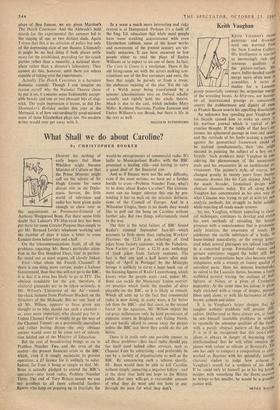What Shall we do about Caroline?
By CHRISTOPHER BOOKER
On the telecommunications front, of all the problems requiring Mr. Benn's particular atten- tion in the first Hundred Days, four in particu- lar stand out as most urgent, all closely linked.
First--what about the Fourth Channel? If there is one thing more certain, under a Labour Government, than that this will not go to the BBC, it is that it is even less likely to go to ITV. The obvious candidate for the job, therefore, if electoral gimmicks are to be taken seriously, is Mr. Wilson's 'University of the Air'—round- the-clock lectures from Professor Blackett on the Structure of the Molecule. But no one, least of all Mr. Wilson, appears to have given any thought as to who should run such a channel— or, even more important, who should pay for it. Unless Channel Four is simply to go the way of the Channel Tunnel—as a perennially unrealised and rather boring dream--the only obvious answer would seem to be some sort of subven- tion fiddled out of the Ministry of Education.
But the cost of broadcasting brings us on to Problem Number Two and the crux of the matter—the present financial crisis at the BBC which, even if it simply maintains its present operation, a £7 licence fee is unlikely to solve. Indeed, far from it being as simple as that, Mr. Benn is actually pledged to extend the BBC's operation—into local radio, Problem Number Three. The end of Tory Britain means we can say goodbye to all those colourful faceless , figures mho keep on popping up in Daylight, the
would-be entrepreneurs of commercial radio. It's hullo to Municipalised Radio, with the BBC promised a leading role—and having to carry a good deal of the financial can.
And as if finance were not the only difficulty, even if the most serious, we have yet a further hurdle to cross—Problem Number Four, what's to be done about Radio Caroline? The Govern- ment can no longer sidestep this one by pre- tending it has to wait on the miasmic delibera- tions of the Council of Europe. And in a Wilsoniart Utopia, there is no doubt they would like to pull out the bung on Caroline without further ado. But two things unfortunately stand in the way.
The first is the total failure of BBC Sound Radio's vaunted September face-lift—which amounts to little more than, replacing Workers' Playtime, the 12.31 p.m. anthology of tired• jokes from factory canteens, with the Fabulous, New Variety on Tour, a 12.31 p.m. anthology of tired jokes from factory canteens. The fact is that one and a half hours after mid- night of 'April' in Portugal' by the Midnight Strings is unlikely to carve a huge hunk out of the listening figures of Radio Luxembourg, which knows what the people want—and, unless Mr. Benn can tackle the Musicians' Union restrict- ive practice which limits the number of discs playable on the BBC, so it is likely to remain. Which all adds up to the fact that commercial radio is now doing, in many ways, a far better job than the BBC—aild that since, as the second factor in the equation, Mr. Wilson enjoys his cut-price millennium only by kind permission of eighteen voters in Brighton and Ealing North, he can hardly afford to sweep away the pirates unless the BBC can show they could do the job better.
There is in truth only one possible answer to all these problems—that local radio should pay for itself (and indeed other services, such as Channel Four by advertising--and preferably be run by a variety of organisations as well as the BBC. By announcing such a scheme shortly, Mr. Benn would then be able to kill Caroline without simply appearing a negative killjoy- and at the same time hold out hope to the British public that they will. get a reasonable amount of what they do want and not have to pay through the nose for what they don't.


































 Previous page
Previous page